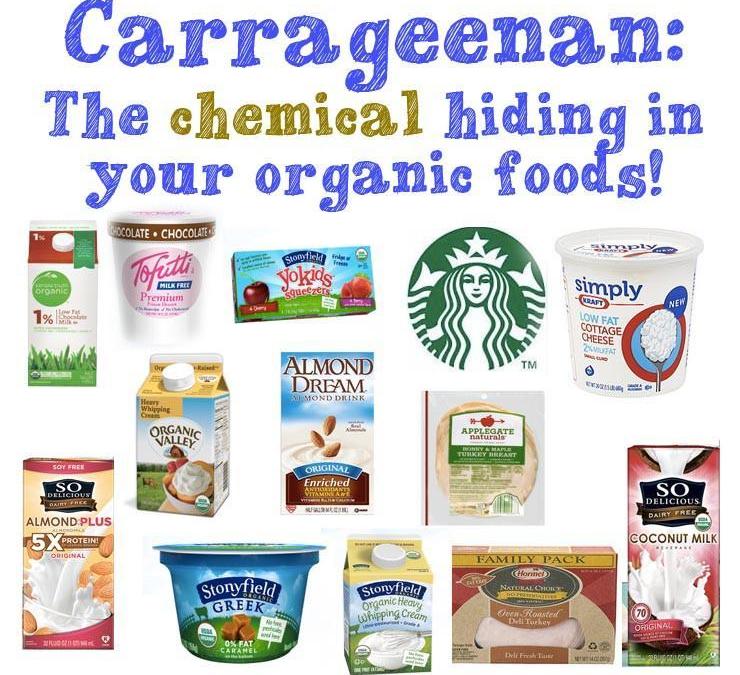

“It has been demonstrated that when guinea pigs are supplied with degraded carrageenan in their drinking water, ulcerations develop in 100% of the animals in their large intestine by the end of a 30-day period (1). The lesions induced by carrageenan in the guinea pigs’ large bowel resemble features of human Ulcerative Colitis (2). Carrageenan has also produced ulcerative lesions in rabbits, mice, and rats that were associated with weight loss, anemia, diarrhea, visible or occult blood, and sometimes mucus in the feces (3).”
What exactly is Carrageenan?

Carrageenan is a common food additive that is extracted from a red seaweed, Chondrus crispus, which is popularly known as Irish moss. Carrageenan, which has no nutritional value, has been used as a thickener and emulsifier to improve the texture of ice cream, yogurt, cottage cheese, soy milk and other non-dairy milks, and other processed foods.
Carrageenan comes in two forms, degraded and undegraded. Degraded carrageenan so reliably causes inflammation of tissues that researchers used it to cause inflammation in mice and rats to test potential anti-inflammatory drugs. So degraded carrageenan was banned from foods, but undegraded carrageenan is not only allowed, it is everywhere.
The problem with undegraded carrageenan is two-fold. First undegraded carrageenan undergoes metabolic changes due to your stomach acid and gut bacterial action and is broken down to…you guessed it…degraded carrageenan. Also tests show that 25% of what is sold as undegraded carrageenan to food manufacturers is actually already degraded.

Why would food manufacturers put carrageenan in their products, even organic labeled products? Well carrageenan is used as an emulsifier, so ingredients stay mixed together and don’t separate. It also works as a thickener, creating that creamy mouth-feel that we miss when we drink non-dairy milk alternatives. Soy, Almond, Coconut, Hemp and Rice milks almost invariably have carrageenan for just that reason. It is much the same reason you will often find it in ice cream.
It is not just the Almond milks, etc of the world…it is ice creams of all types such as So Delicious coconut ice cream, cottage cheese, protein drinks like the popular Myoplex and Muscle Milk. It is found in coffee creamers, creams, sour creams, yogurts and children’s drinkable yogurts, frozen (non-dairy) desserts, Applegate sliced deli meats including those labeled organic, Morningstar veggie burgers, vegetarian & vegan hot dogs, soups, sauces, pet foods, toothpaste, etc. Don’t assume your brand is too clean…it can be found in some products made by Trader Joe’s, Whole Foods 365 line, Horizon, Stonyfield, etc.
But its effects in your intestines and colon are like a nuclear bomb. Carrageenan creates mucosal inflammation, ulcerations and immune cell activation against your gut lining. Since it is in so many popular products you are probably consuming it right now, or will today and maybe tomorrow also. This repeated insult to your mucus tissues wrecks havoc and creates inflamed ulcerations.
It is worth noting that studies on the safety of carrageenan nowadays are done on animals, as human “trials directly assessing the influence of carrageenan in humans are of course unethical to conduct.”
“Further, macroscopic features reminiscent of human UC, such as ulcerations predominantly limited to the mucosa along with pseudopolyps and polypoidal formations, were observed” (3).
“…exposure to carrageenan in animal models include acute, subacute, and chronic inflammatory changes in the mucosa; occasional crypt abscesses; cystic dilatation or distortion of mucosal glands; mucosal ulceration in various stages of progression; and hyperplastic changes of the glandular epithelium (3).”
“animals fed a 2% solution of carrageenan mixed with standard rat chow developed small bowel lesions first (from 2 to 6 weeks) followed by colonic lesions that developed after 8 weeks (4)”
“…carrageenan aggravated the severity (both clinical and histological) of colitis, with a concomitant increased expression of IL-6 and tumor necrosis factor alpha (TNF)-α…(5). Taken together, these animal studies have led to the hypothesis that food emulsifiers such as carrageenan may act as a conditional inflammatory agent that magnifies any existing chronic inflammation of the intestinal tract.”
There is quite a body of research showing that in animal studies, use of carrageenan and the resulting ulcerations increase the incidence of colon cancer.
So if you have any digestive issue, condition such as IBS and Leaky Gut, or suffer from IBD like Crohn’s and Ulcerative Colitis…it is crucial that you go through the ingredient list on any food or liquid you consume and look for Carrageenan.
Many of you will be surprised at what you find. Remove the food from your diet, and find another brand that does not use carrageenan, there are many quality options. Many major food companies are bowing to pressure and removing carrageenan from their products. A quick email or phone call to your favorite brand that uses carrageenan will help accelerate this process. After six years of the health advocacy group Cornucopia’s research, advocacy, and petitioning, the National Organic Standards Board (NOSB) voted in November 2016 to remove carrageenan, a potent inflammatory agent and possible carcinogen, from the National List for use in organics.
Cornucopia also provides an excellent report on the dangers of Carrageenan
cornucopia.org/wp-content/uploads/2016/04/CarageenanReport-2016.pdf
References:
1. Watt J, Marcus R. Carrageenan-induced ulceration of the large intestine in the guinea pig. Gut (1971) 12(2):164–71
2. Anver MR, Cohen J. Animal model of human disease. Ulcerative colitis. Animal model: ulcerative colitis induced in guinea pigs with degraded carrageenan. Am J Pathol (1976) 84(2):431–4
3. Watt J, Marcus R. Experimental ulcerative disease of the colon in animals. Gut (1973) 14(6):506–
4. Pricolo VE, Madhere SM, Finkelstein SD, Reichner JS. Effects of lambda-carrageenan induced experimental enterocolitis on splenocyte function and nitric oxide production. J Surg Res (1996) 66(1):6–11.10.1006/jsre.1996.0364
5. Wei W, Feng W, Xin G, Tingting N, Zhanghe Z, Haimin C, et al. Enhanced effect of kappa-carrageenan on TNBS-induced inflammation in mice. Int Immunopharmacol (2016) 39:218–28.10.1016/j.intimp.2016.07.031
Leave a comment